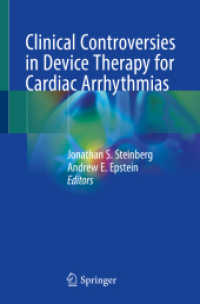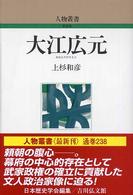- ホーム
- > 洋書
- > 英文書
- > Psychology
Full Description
In this volume, a diverse group of world experts in personality assessment showcase a range of different viewpoints on response distortion. Contributors consider what it means to "fake" a personality assessment, why and how people try to obtain particular scores on personality tests, and what types of tests people can successfully manipulate. The authors present and discuss the usefulness of a range of traditional and cutting-edge methods for detecting and controlling the practice of faking. These methods include social desirability (lie) scales, warnings, affective neutralization, unidimensional and multidimensional pairwise preferences, decision trees, linguistic analysis, situational measures, and methods based on item response theory. The wide range of viewpoints presented in this book are then summarized, synthesized, and evaluated. The authors make practical recommendations and suggest areas for future research. Anyone who wonders whether people exaggerate or lie outright on personality tests -- or questions what psychologists can and should do about it -- will find in this book stimulating questions and useful answers.
Contents
I. General Background ; 1. Faking: Knowns, Unknowns, and Points of Contention ; Matthias Ziegler, Carolyn MacCann, and Richard D. Roberts ; II. Do People Fake and Does It Matter? The Existence of Faking and Its Impact on Personality Assessments ; 2. People Fake Only When They Need to Fake ; Jill E. Ellingson ; 3. The Rules of Evidence and the Prevalence of Applicant Faking ; Richard L. Griffith and Patrick D. Converse ; 4. Questioning Old Assumptions: Faking and the Personality-Performance Relationship ; D. Brent Smith and Max McDaniel ; 5. Faking Does Distort Self-Report Personality Assessment ; Ronald R. Holden and Angela S. Book ; III. Can We Tell if People Fake? The Detection and Correction of Response Distortion ; 6. A Conceptual Representation of Faking: Putting the Horse Back in Front of the Cart ; Eric D. Heggestad ; 7. Innovative Item Response Process and Bayesian Faking Detection Methods: More Questions than Answers ; Nathan R. Kuncel, Matthew Bornemann, and Thomas Kiger ; 8. Searching for Unicorns: Item Response Theory Based Solutions to the Faking Problem ; Michael J. Zickar and Katherine A. Wolford ; 9. Methods for Correcting For Faking ; Matthew C. Reeder and Ann Marie Ryan ; 10. Overclaiming on Personality Questionnaires ; Delroy L. Paulhus ; 11. The Detection of Faking through Word Use ; Matthew Ventura ; IV. Can We Stop People from Faking? Preventative Strategies ; 12. Application of Preventative Strategies ; Stephan Dilchert and Deniz Ones ; 13. Social Desirability in Personality Assessment: Outline of a Model to Explain Individual Differences ; Martin Backstrom, Fredrik Bjorklund, and Magnus R. Larsson ; 14. Constructing Fake-Resistant Personality Tests Using Item Response Theory: High Stakes Personality Testing with Multidimensional Pairwise Preferences ; Stephen Stark, Oleksandr S. Chernyshenk, and Fritz Drasgow ; 15. Is Faking Inevitable? Person-level Strategies for Reducing Faking ; Brian Lukoff ; V. Is Faking a Consequential Issue Outside a Job Selection Context? Current Applications and Future Directions in Clinical and Educational Settings ; 16. Plaintiffs who Malinger: Impact of Litigation on Fake Testimony ; Ryan C.W. Hall and Richard C.W. Hall ; 17. Intentional and Unintentional Faking in Education ; Jeremy Burrus, Bobby D. Naemi, and Patrick C. Kyllonen ; VI. Conclusions ; 18. Faking in Personality Assessment: Reflections and Recommendations ; Carolyn MacCann, Matthias Ziegler, and Richard D. Roberts ; 19. Faking in Personality Assessment: Concluding Thoughts ; Paul Sackett







